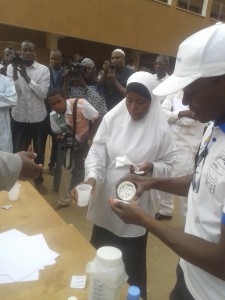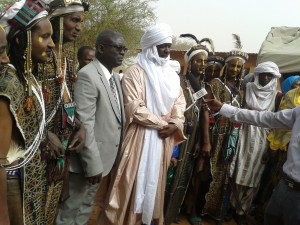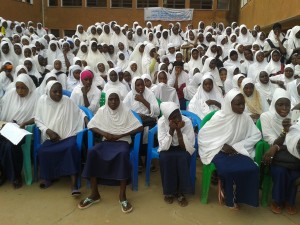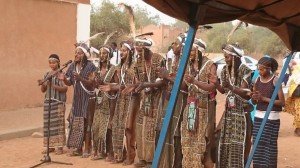On the ground during Niger’s eighth annual integrated MDA for NTDs
June 23rd, 2015

A student receives NTD medication at Niger’s 2015 MDA launch at the Collège d’Enseignement Général (CEG 5) middle school in Niamey. Photo: Dr Yayé Youssouf, NTD Program Manager, HKI
Niger’s National Neglected Tropical Disease (NTD) Program launched its eighth annual mass drug administration (MDA) campaign in Niamey in March 2015. His Excellence Mano Aghali, Minister of Public Health of Niger presided at the launch event, which was held at the Collège d’Enseignement Général (CEG 5) middle school in Niamey and attended by an estimated 500-1,000 people, including Dr. Kadri Boubacar, Dr. Salissou Adamou and Dr. Gnandou Issa, the coordinators of the Ministry of Health’s eye health, lymphatic filariasis/onchocerciasis, and schistosomiasis/geohelminthes programs, respectively, as well as other Ministry of Health and Ministry of Education officials, NGO representatives and many students.
Students are important in the fight against NTDs because not only do they comprise a large segment of the target group that needs the disease-preventing drugs, they also serve as important advocates by encouraging their families to participate in the MDA.
H.E. Aghali spoke about the link between NTDs and poverty at the MDA launch ceremony. Since NTDs exacerbate and perpetuate poverty and are most prevalent in the poorest communities, the fight against NTDs is an important component of the Government’s Nigeriens feed Nigeriens (les Nigeriens Nourissent les Nigeriens) anti-poverty program, he said.

His Excellence Mano Aghali, Minister of Public Health of Niger (fourth from left) speaks at Niger’s 2015 MDA Launch, accompanied by Dr. Assimawé Pana, Resident Representative of the WHO (to his left) and Andital, a group of traditional Bororo Peuhl singers and dancers. Photo: Dr. Salissou Adamou Bathiri, National Coordinator of Onchocerciasis and Lymphatic Filariasis, Ministry of Public Health of Niger
In his speech, H.E. Aghali also stressed the importance of taking the free drugs provided by USAID’s END in Africa project to treat and prevent lymphatic filariasis (elephantiasis), onchocerciasis (river blindness), schistosomiasis, soil-transmitted helminthes (intestinal worms), and trachoma.
Following the address by H.E. Aghali, Helen Keller International Country Director for Niger Mr. Jeff Ratcliffe said, “these diseases still are a major public health problem, and I would like to praise organizations such as Helen Keller International, which joined the fight against these diseases very early through this project funded by USAID,” referring to the END in Africa project. Financed by USAID, administered by FHI 360 and executed by HKI in the case of Niger, the End in Africa project provides MDA, disease monitoring and NTD-related technical assistance to five West African countries—Niger, Burkina Faso, Ghana, Sierra Leone and Togo.

Students at the Collège d’Enseignement Général (CEG 5) middle school in Niamey during Niger’s 2015 MDA launch. Photo: Dr. Salissou Adamou Bathiri, National Coordinator of Onchocerciasis and Lymphatic Filariasis, Ministry of Public Health of Niger
Following the launching ceremony, the MDA officially began in the capital of Niamey with distribution of the drug praziquantel to treat schistosomiasis. Over the course of the next few weeks, eligible residents in 31 of Niger’s 42 health districts received treatment for one or more NTDs, and preliminary reports indicate that over 10 million doses of medicine were distributed.[1]
The MDA has now been concluded in every region except Diffa. Drug distribution has been difficult in some areas of Diffa due to insecurity brought on by attacks by Boko Haram and subsequent counter-insurgency by the Nigerien army. At the time the MDA began, a state of emergency had been declared by the Governor of Diffa, and the NTD Program had originally thought that it would not be possible to carry out MDA in that region. However, the Prime Minister instructed NGOs and other organizations working in Diffa to continue their activities, insisting that the population of Diffa had a right to receive NTD drug treatments, among other services.

Andital, a traditional group of ethnic Bororo Peuhl singers and dancers, performs at the 2015 MDA launch in Niamey, Niger. Photo: Dr Yayé Youssouf, NTD Program Manager, HKI
Although the MDA in Diffa has been challenging, as certain areas are completely inaccessible and a large proportion of the population has fled (mainly to Niger’s Zinder region), the region is currently continuing to distribute NTD drug treatments wherever possible. MDA has generally taken place only at fixed sites within communities, rather than via the preferred door-to-door method. While preliminary reports indicate low levels of epidemiological coverage for the districts in Diffa, it’s likely that many residents who fled the region received MDA in Zinder or another region.
[1] A dose is a treatment for schistosomiasis, lymphatic filariasis (which also treats onchocerciasis and soil-transmitted helminthes), or trachoma. A dose does not correspond to the number of people treated, since many people receive treatment for more than one NTD.

